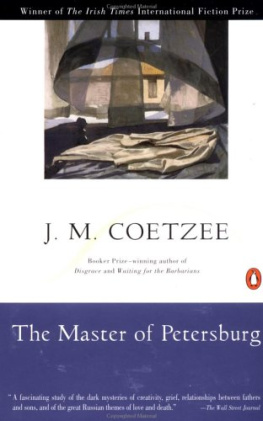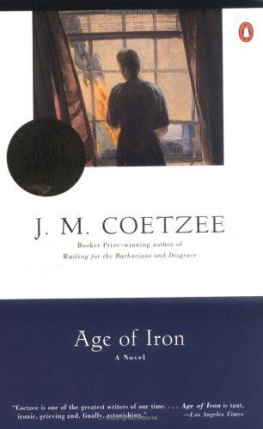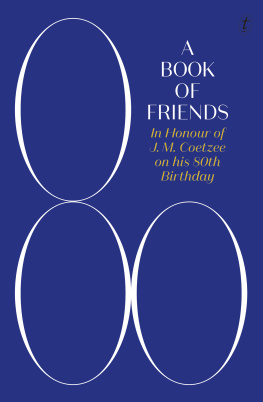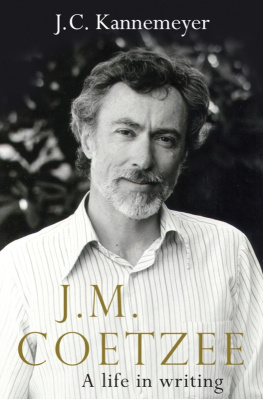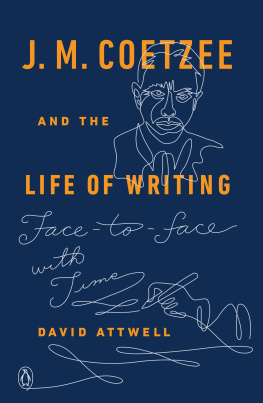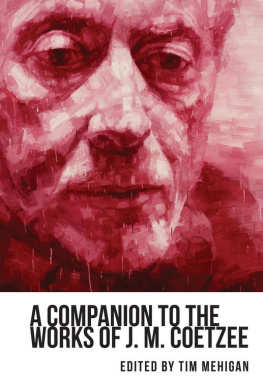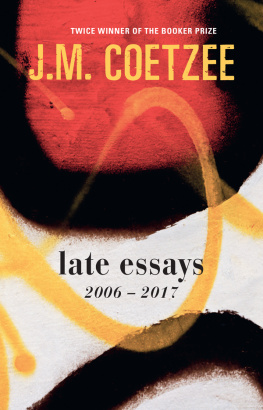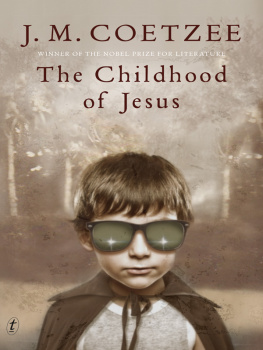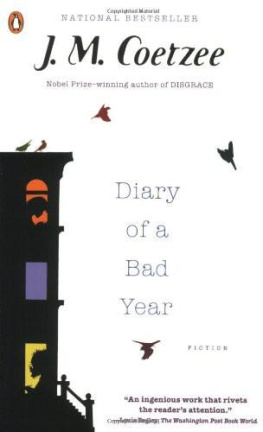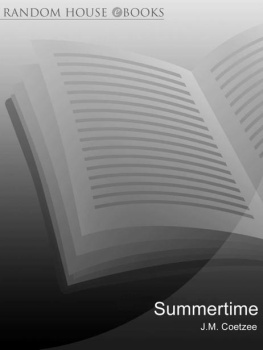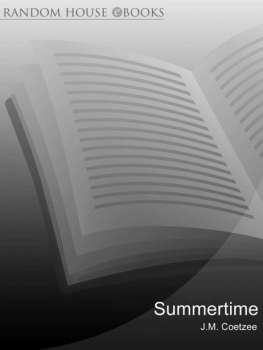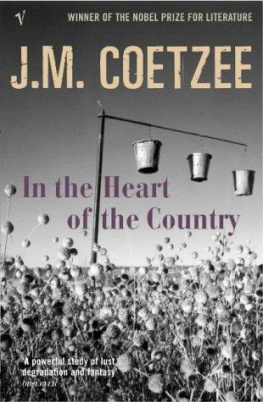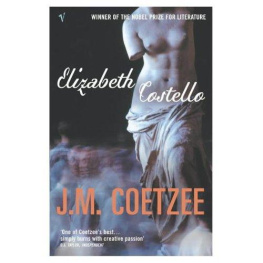J.M Coetzee - The Master of Petersburg
Here you can read online J.M Coetzee - The Master of Petersburg full text of the book (entire story) in english for free. Download pdf and epub, get meaning, cover and reviews about this ebook. year: 1994, genre: Detective and thriller. Description of the work, (preface) as well as reviews are available. Best literature library LitArk.com created for fans of good reading and offers a wide selection of genres:
Romance novel
Science fiction
Adventure
Detective
Science
History
Home and family
Prose
Art
Politics
Computer
Non-fiction
Religion
Business
Children
Humor
Choose a favorite category and find really read worthwhile books. Enjoy immersion in the world of imagination, feel the emotions of the characters or learn something new for yourself, make an fascinating discovery.
- Book:The Master of Petersburg
- Author:
- Genre:
- Year:1994
- Rating:3 / 5
- Favourites:Add to favourites
- Your mark:
- 60
- 1
- 2
- 3
- 4
- 5
The Master of Petersburg: summary, description and annotation
We offer to read an annotation, description, summary or preface (depends on what the author of the book "The Master of Petersburg" wrote himself). If you haven't found the necessary information about the book — write in the comments, we will try to find it.
The Master of Petersburg — read online for free the complete book (whole text) full work
Below is the text of the book, divided by pages. System saving the place of the last page read, allows you to conveniently read the book "The Master of Petersburg" online for free, without having to search again every time where you left off. Put a bookmark, and you can go to the page where you finished reading at any time.
Font size:
Interval:
Bookmark:
J.M. Coetzee
The Master of Petersburg
1. Petersburg
October, 1869. A droshky passes slowly down a street in the Haymarket district of St Petersburg. Before a tall tenement building the driver reins in his horse.
His passenger regards the building dubiously. 'Are you sure this is the place?' he asks.
' Sixty-three Svechnoi Street, that's what you said.'
The passenger steps out. He is a man in late middle age, bearded and stooped, with a high forehead and heavy eyebrows that lend him an air of sober self-absorption. He wears a dark suit of somewhat dmod cut.
'Wait for me,' he tells the driver.
Beneath scarred and peeling exteriors the older houses of the Haymarket still retain some of their original elegance, though most have by now become rooming-houses for clerks and students and working-folk. In the spaces between them, sometimes sharing walls with them, have been erected rickety wooden structures of two or even three storeys, warrens of rooms and cubicles, the homes of the very poorest.
No. 63, one of the older dwellings, is flanked on both sides by structures of this kind. Indeed, a web of beams and struts crosses its face at mid-level, giving it a hemmed-in look. Birds have nested in the crooks of the reinforcing, and their droppings stain the faade.
A band of children who have been climbing the struts to lob stones into puddles in the street, then leaping down to retrieve them, pause in their game to inspect the stranger. The three youngest are boys; the fourth, who seems to be their leader, is a girl with fair hair and striking dark eyes.
'Good afternoon,' he calls out. 'Do any of you know where Anna Sergeyevna Kolenkina lives?'
The boys make no response, staring at him unyieldingly. But the girl, after a moment, lets fall her stones. 'Come,' she says.
The third floor of No. 63 is a warren of interconnecting rooms giving off from a landing at the head of the stairs. He follows the girl down a dark, hook-shaped passageway that smells of cabbage and boiled beef, past an open washroom, to a grey-painted door which she pushes open.
They are in a long, low room lit by a single window at head-height. Its gloom is intensified by a heavy brocade on me longest wall. A woman dressed in black rises to face him. She is in her middle thirties; she has the same dark eyes and sculpted eyebrows as the child, but her hair is black.
'Forgive me for coming unannounced,' he says. 'My name' He hesitates. 'I believe my son has been a lodger of yours.'
From his valise he takes an object and unwraps the white napkin around it. It is a picture of a boy, a daguerreotype in a silvered frame. 'Perhaps you recognize him,' he says. He does not give the picture into her hands.
'It is Pavel Alexandrovich, Mama,' whispers the child.
'Yes, he stayed with us,' says the woman. 'I am very sorry.' There is an awkward silence. 'He was a lodger here since April,' she resumes. 'His room is as he left it, and all his belongings, except for some things that the police took. Do you want to see?'
'Yes,' he says hoarsely. 'If there is rent owed, I am of course responsible.'
His son's room, though really only a cubicle partitioned off from the rest of the apartment, has its own entrance as well as a window on to the street. The bed is neatly made up; for the rest, there is a chest of drawers, a small table with a lamp, a chair. At the foot of the bed is a suitcase with the initials P. A. I. embossed on it. He recognizes it: a gift of his to Pavel.
He crosses to the window and looks out. On the street the droshky is still waiting. 'Will you do something for me?' he asks the girl. 'Will you tell the driver he can go now, and will you pay him?'
The child takes the money he gives her and leaves.
'I would like to be by myself for a while, if you don't mind,' he tells the woman.
The first thing he does when she has left is to turn back the covers of the bed. The sheets are fresh. He kneels and puts his nose to the pillow; but he can smell nothing but soap and sun. He opens the drawers. They have been emptied.
He lifts the suitcase on to the bed. Neatly folded on
top is a white cotton suit. He presses his forehead to it.
Faintly the smell of his son comes to him. He breathes in deeply, again and again, thinking: his ghost, entering me.
He draws the chair to the window and sits gazing out. Dusk is falling, deepening. The street is empty. Time passes; his thoughts do not move. Pondering, he thinks -that is the word. This heavy head, these heavy eyes: lead settling into the soul.
The woman, Anna Sergeyevna, and her daughter are having supper, sitting across the table from each other with the lamp between them. They fall silent when he enters.
'You know who I am?' he says.
She looks steadily at him, waiting.
'You know, I mean, that I am not Isaev?'
'Yes, we know. We know Pavel's story.'
'Don't let me interrupt your meal. Do you mind if I leave the suitcase behind for the time being? I will pay to the end of the month. In fact, let me pay for November too. I would like to keep the room, if it isn't promised.'
He gives her the money, twenty roubles.
'You don't mind if I come now and then in the afternoons? Is there someone at home during the day?'
She hesitates. A look passes between her and the child. Already, he suspects, she is having second thoughts. Better if he would take the suitcase away and never come back, so that the story of the dead lodger could be closed and the room freed. She does not want this mournful man in her home, casting darkness all about him. But it is too late, the money has been offered and accepted.
'Matryosha is at home in the afternoons,' she says quiedy. 'I will give you a key. Could I ask you to use your own entrance? The door between the lodger's room and this one doesn't lock, but we don't normally use it.'
'I am sorry. I didn't realize.'
Matryona.
For an hour he wanders around the familiar streets of the Haymarket quarter. Then he makes his way back across Kokushkin Bridge to the inn where, under the name Isaev, he took a room earlier in the day.
He is not hungry. Fully dressed, he lies down, folds his arms, and tries to sleep. But his mind goes back to No. 63, to his son's room. The curtains are open. Moonlight falls on the bed. He is there: he stands by the door, hardly breathing, concentrating his gaze on the chair in the corner, waiting for the darkness to thicken, to turn into another kind of darkness, a darkness of presence. Silently he forms his lips over his son's name, three times, four times.
He is trying to cast a spell. But over whom: over a ghost or over himself? He thinks of Orpheus walking backwards step by step, whispering the dead woman's name, coaxing her out of the entrails of hell; of the wife in graveclothes with the blind, dead eyes following him, holding out limp hands before her like a sleepwalker. No flute, no lyre, just the word, the one word, over and over. When death cuts all other links, there remains still the name. Baptism: the union of a soul with a name, the name it will carry into eternity. Barely breathing, he forms the syllables again: Pavel.
His head begins to swim. 'I must go now,' he whispers or thinks he whispers; 'I will come back.'
I will come back: the same promise he made when he took the boy to school for his first term. You will not be abandoned. And abandoned him.
He is falling asleep. He imagines himself plunging down a long waterfall into a pool, and gives himself over to the plunge.
2. The cemetery
They meet at the ferry. When he sees the flowers Matryona is carrying, he is annoyed. They are small and white and modest. Whether Pavel has a favourite among flowers he does not know, but roses, whatever roses cost in October, roses scarlet as blood, are the least he deserves.
Next pageFont size:
Interval:
Bookmark:
Similar books «The Master of Petersburg»
Look at similar books to The Master of Petersburg. We have selected literature similar in name and meaning in the hope of providing readers with more options to find new, interesting, not yet read works.
Discussion, reviews of the book The Master of Petersburg and just readers' own opinions. Leave your comments, write what you think about the work, its meaning or the main characters. Specify what exactly you liked and what you didn't like, and why you think so.

